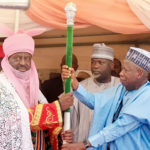After the euphoria of the recently concluded general elections has died down, Chris Okotie’s widely published May Day message could not have come at a better time.
In his press release, while supporting the newly approved national minimum wage, Rev. Okotie advised governments and stakeholders on the need to focus more on long-term economic growth through multi-product export so as to ensure sufficient revenue to meet the increased wage obligations.
This, indeed, should be the challenge of all stakeholders in the polity. To continue to depend on the shrinking revenue from crude oil export to finance the federal budget is to put the economic back on the road to recession. Many have expressed fears on the bandwagon effect of the new N30,000 national minimum wage.
Teachers morale low in Oyo, NUT may embark on indefinite strike Monday
If the economy slides back into recession from the first quarter of 2020 as glibly predicted by the Zamfara State governor, Abdulaziz Yari, the current chairman of the Governor’s Forum, the hope of implementing the new minimum wage may be shattered. That scenario confirms the fears of the pastor-politician about the grim prospects of the economy based on the current contractions being experienced.
There are outstanding labour disputes like those between university lecturers and the Federal Governments, doctors and some governments as well as pensioners, etc. How the new minimum wage would impact on these pending labour disputes remains to be seen.
As for the new wage itself, it is not yet time to celebrate because of a likely increase in fuel pump price and the general price hikes that follow every wage increase. This probably informed Rev. Okotie’s call for the comprehensive reforms of our labour laws to bring them in harmony with the statutes of the International Labour Organisation, ILO. These reforms are long overdue.
Rev. Okotie argued that harmonious labour-employer relation is at the heart of any buoyant economy and “a productive work force deserves a decent pay; employers should also respect labour rights so as to avert disruptive strikes which often hurt the economy.”
Our workers and employers should take this admonition to heart as we begin another democratic journey after the 2019 general election.
Gbenga Daniels
Lagos.






